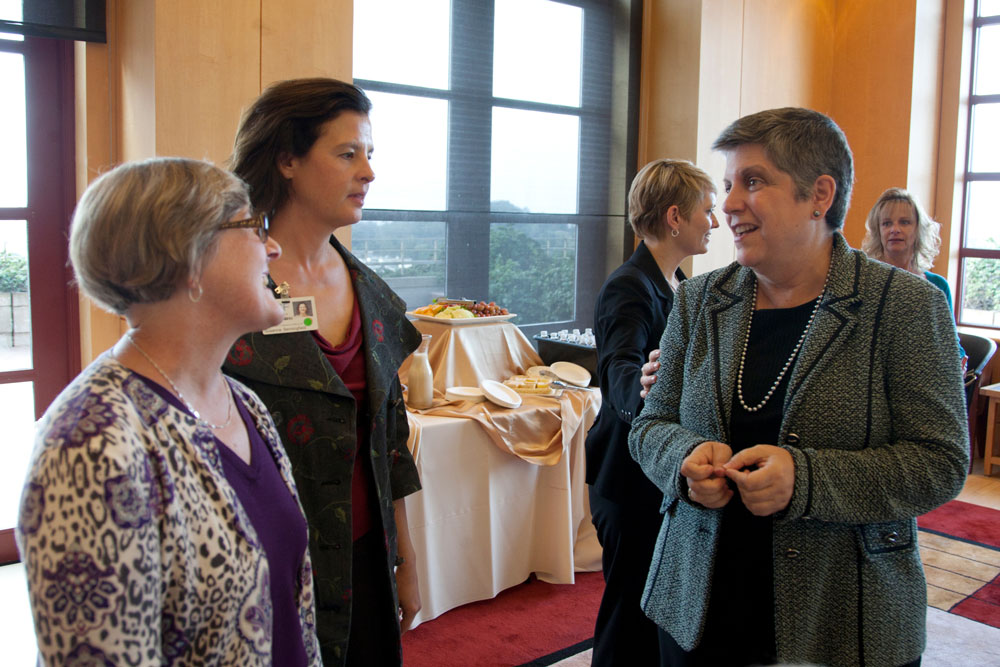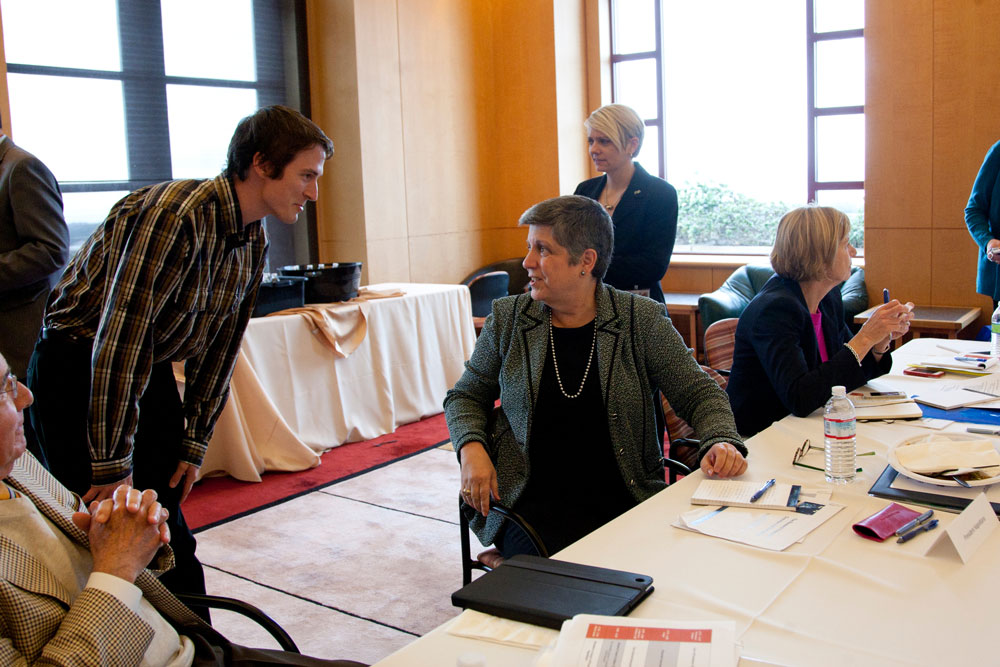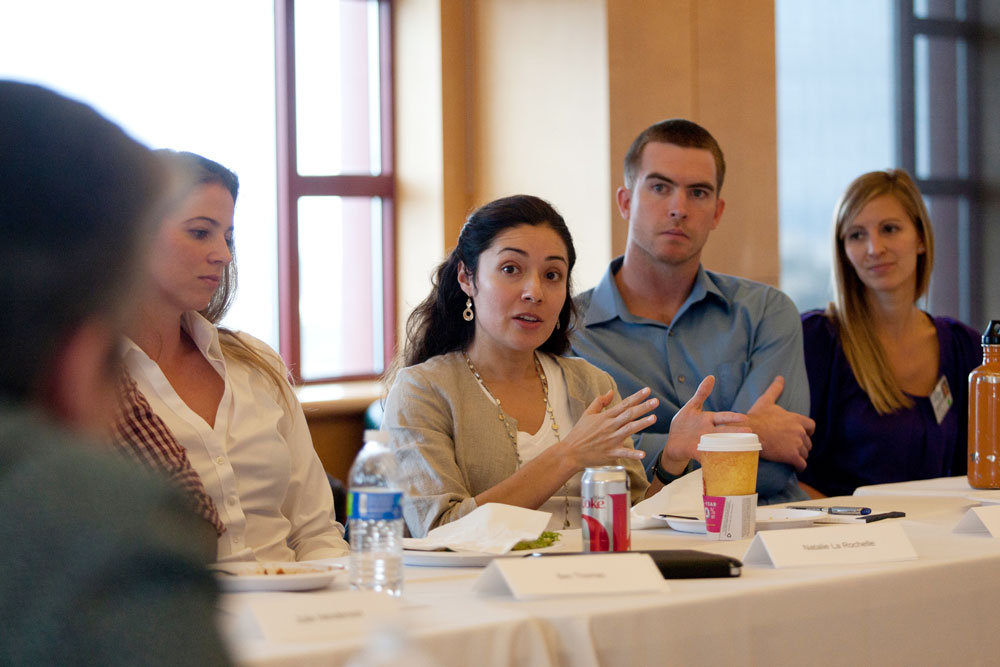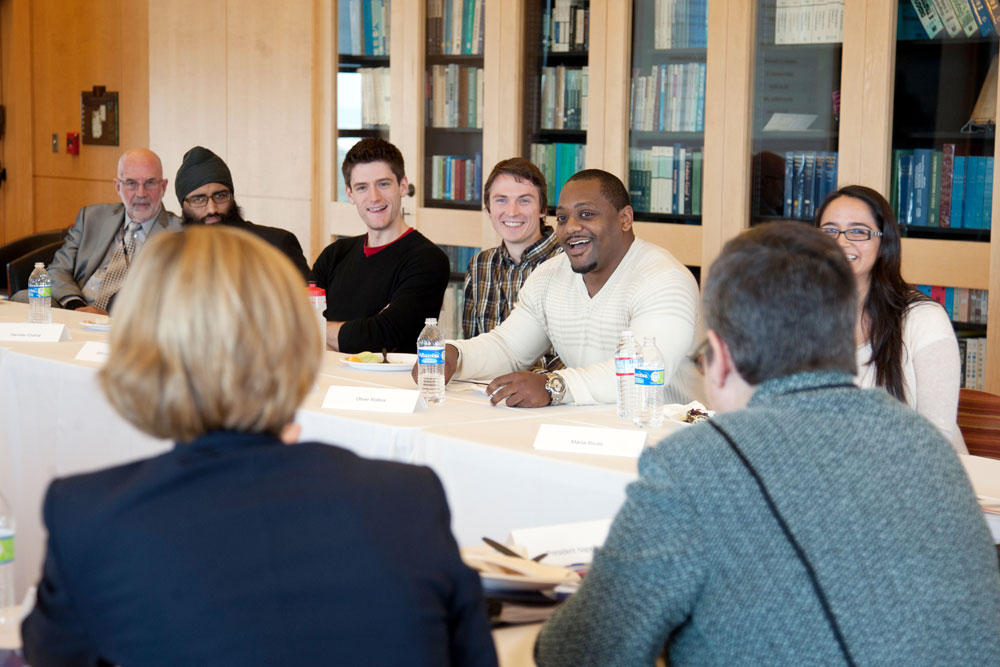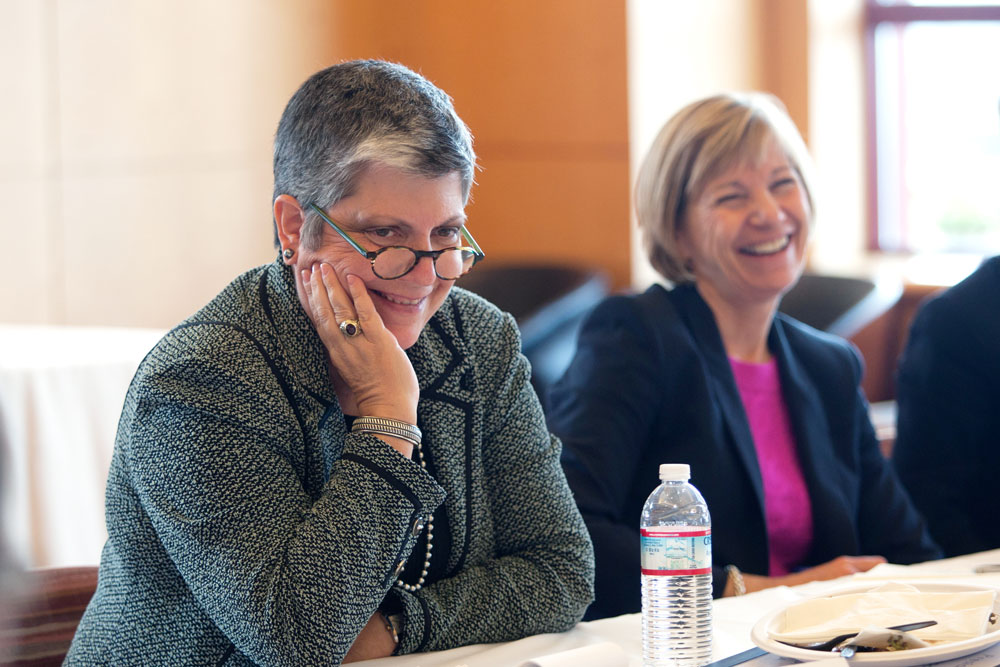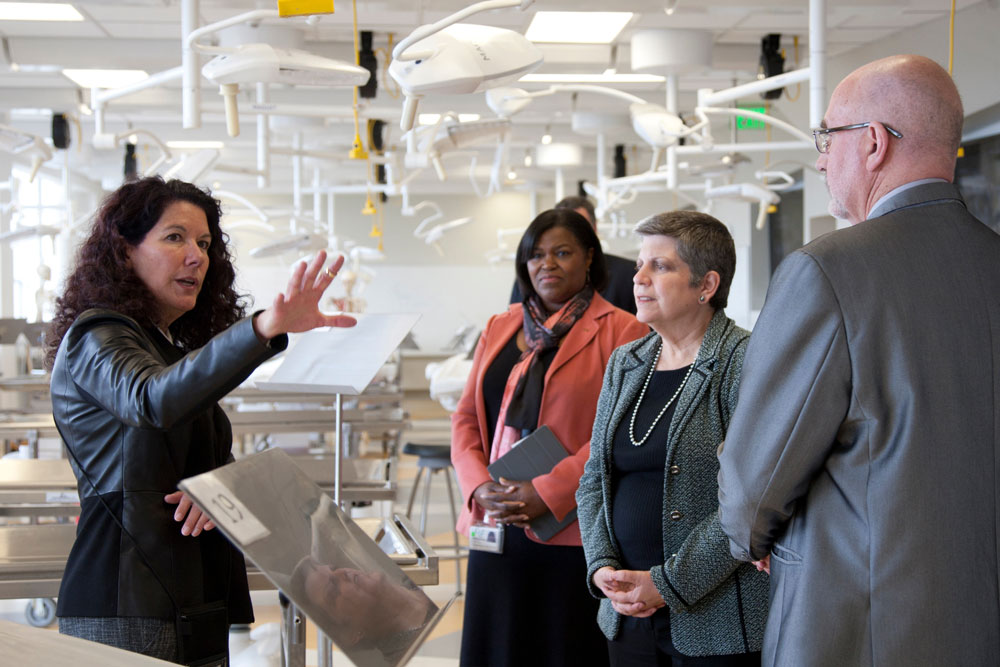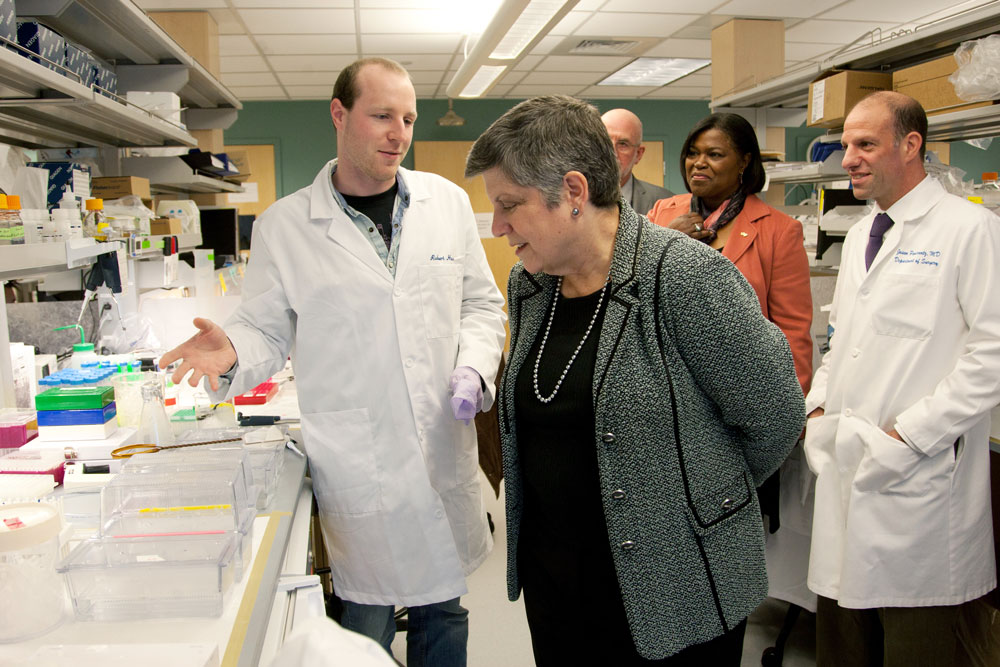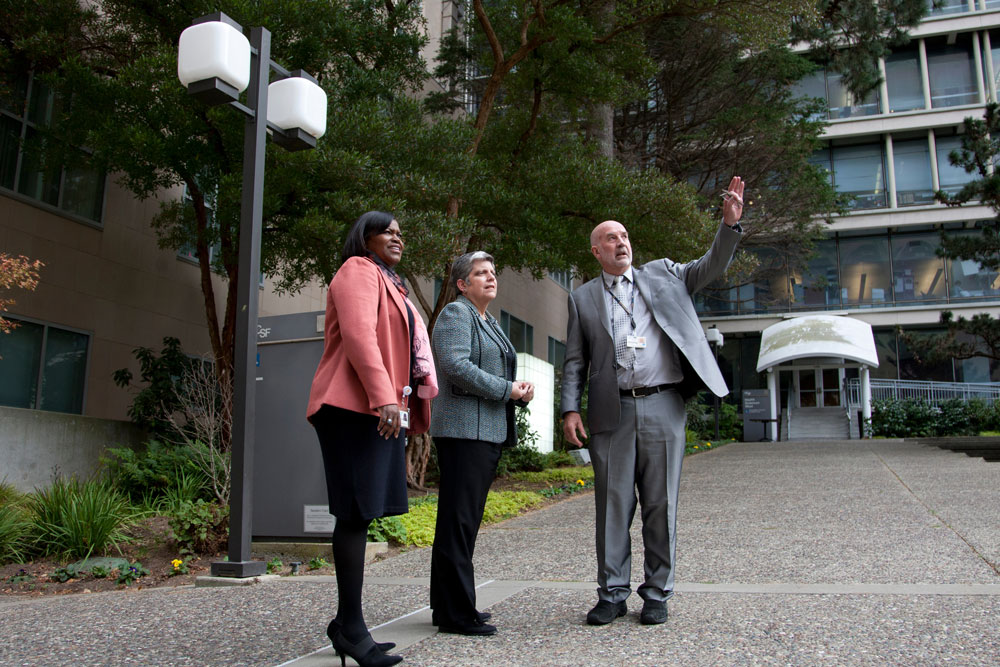New UC President Visits UCSF to Listen and Learn
Janet Napolitano Meets Faculty, Staff, Students to Understand Unique Aspects of Health Sciences Campus
Janet Napolitano, the University of California’s newly appointed president, visited UC San Francisco on Monday for the eighth stop of her “listening and learning” tour of all 10 campuses.
The former secretary of Homeland Security, who took office on Sept. 30, has made it a priority to visit each UC campus within her first three months as president “so I can make better decisions as to how the Office of the President is actually value added to the whole, looking at what we can do best versus what each individual campus does best.”
Monday’s visit to UCSF focused on the Parnassus campus, just a week after she attended her first UC Regents’ meeting at Mission Bay. She began the day meeting with Chancellor Susan Desmond-Hellmann, MD, MPH, then listened to presentations by campus leaders on UCSF’s highest strategic priorities – education, research and patient care. A presentation was also made on UCSF’s 10-year financial projections.
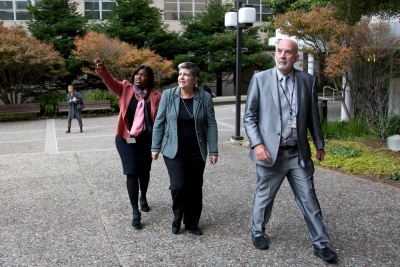
UC President Janet Napolitano, center, takes a walking tour of the Parnassus campus. Scroll through the slideshow above to see more highlights of her visit to UCSF.
But the main opportunity was for Napolitano to talk to UCSF’s faculty, staff, students and volunteers.
During a morning staff meet-and-greet, representatives from Academic Business Officers Group, Staff Council and Campus Life Services discussed the potential benefits of having a strong culture of promoting professional development, more mentorship and continuing management training.
Susanna Benningfield, a clinical research coordinator in the School of Medicine, told Napolitano about a leadership development program that took her out of the silo she was working in and helped her “understand how it all fit together and how what I did really was furthering the mission of the University.”
“That has been transformative here at UC,” Benningfield said. “How can we scale this up?”
Over lunch, Napolitano chatted with a group of students, asking them what brought them to UCSF and what factors may have kept them from coming here.
“UCSF was always my No. 1 choice. I love the name that UCSF has with it. Anywhere you go, people respect you, they know the kind of education you get here, so that was really attractive to come here,” said Erin Carlson, a second-year physical therapy student.
Students pointed to UCSF’s diversity, dedicated faculty and commitment to its public mission as major selling points, but agreed on one issue that poses a barrier: cost.
"I was appreciative that she took that into account, realizing why some of the best and brightest don’t choose to come here – but also understanding that UCSF has a legacy and a reputation that will always attract the best and the brightest despite that," fourth-year medical student Ben Thomas said after the lunch.
During the session, students shared stories about their difficulties securing funding for PhD programs, having to juggle rising tuition rates and the high cost of living in San Francisco. As throughout the day, Napolitano listened carefully, taking copious notes and encouraging people to offer their perspectives.
“I think you’re getting a world-class education, and now we need to make sure you’re getting world-class opportunities,” she told the students.
Understanding the Breadth and Depth of UCSF
The new president already has announced a number of initiatives, including $5 million toward recruiting graduate students and $5 million toward postdoctoral fellowships. These investments, as well as her focus on translational research, are a promising start to her tenure, Desmond-Hellmann said.
"President Napolitano is coming in with a sense of vigor and forward thinking that will have a great impact on the whole system,” the chancellor said.
“I’m excited to work with her on her new initiatives, especially her focus on graduate education and bringing our basic discoveries to society as efficiently as possible. These are among our top priorities at UCSF, aligning wonderfully with her vision.”
Campus leaders also briefed Napolitano on various aspects of the University, including:
- Finance. John Plotts, senior vice chancellor of finance and administration, emphasized that the University is operating in a competitive, market-driven and rapidly changing environment. To respond to this and realize its aspirations as a university, UCSF must develop alternatives and make choices involving allocation of resources, he said.
- Education. Elizabeth Watkins, PhD, vice chancellor of student academic affairs, and Catherine Lucey, vice dean for education in the School of Medicine, highlighted UCSF’s focus on training health care providers with the triple aims of improved patient experience, increased health for populations and decreased cost of care. The top-ranked educational experience here also fosters creativity by immersing students in a culture of cutting-edge research and collaborative approaches, Watkins said.
- Research. UCSF is a renowned leader in basic, translational and population research, as evidenced by its national rankings and receiving more National Institutes of Health funding than any other public institution in 2012. Executive Vice Chancellor and Provost Jeff Bluestone, PhD, highlighted these achievements and offered examples of the University’s leadership in precision medicine, aging research, stem cell discoveries and many other areas.
- Patient Care. UCSF Medical Center CEO Mark Laret and School of Medicine Dean Sam Hawgood, MBBS, led a small-group discussion about the clinical enterprise and plans for the February 2015 opening of the new Mission Bay medical center for women, children and cancer patients.
-
Academic Senate. Farid Chehab, PhD, chair of the UCSF Academic Senate, and other leaders reviewed key issues that their group is facing, highlighting a number of ways that UCSF's senate differs from sister institutions.
Capping Napolitano’s visit, UCSF Foundation Chair Bill Oberndorf and the chancellor co-hosted a reception for Foundation volunteers, donors and student panelists.
“UCSF is unique in our singular focus on health as well as our focus on graduate and professional education. We had very productive talks with President Napolitano about these unique aspects of our campus and how we can work together to support her systemwide goals,” Desmond-Hellmann said.
Photos by Cindy Chew
